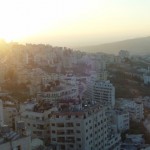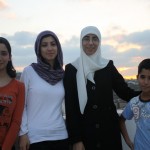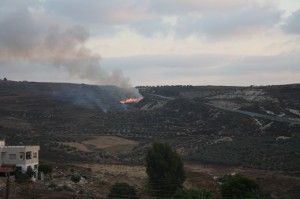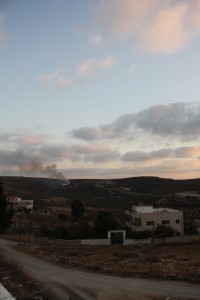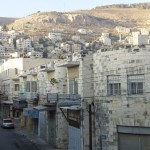
Read the original article on www.antiwar.com
AZZUN ATMA, Northern West Bank – For seven years Majda Abdul Qader Sheikh, 38, has not been allowed to visit the home of her parents, just a few hundred meters from her house.
“I tried to get a special visitor’s permit for a quick visit during the Muslim holy month of Ramadan but I was refused,” says Sheikh, mother of seven children. “I have had no problems with the Israeli authorities, nor am I considered a security threat,” she added.
Sheikh is not trying to leave the West Bank or even travel to another city. Instead she is trying to access another part of the Palestinian village Azzun Atma where she lives with her husband and children.
This agricultural village of 2,000 residents falls in Qalqilya district in the northern West Bank. It is one of more than 50 Palestinian communities, comprising 35,000 people, trapped in a “seam zone” and surrounded by Israeli settlements on three sides.
The seam zone is located between the Green Line (GL) — Israel’s internationally recognized border with the West Bank — and Israel’s separation barrier, supposedly built for “security reasons” in 2003. The barrier, comprising fences, ditches and walls, veers off the GL and cuts deeply into Palestinian territory.
The barrier, deemed illegal by the International Court of Justice in The Hague, has been designed to incorporate many of Israel’s settlements in the West Bank as well as the Palestinian land which has been illegally acquired.
The UN Office for the Coordination of Humanitarian Affairs (OCHA) says the barrier leaves almost 10 percent of the West Bank territory on the Israeli side, but outside the Green Line. Qalqilya district alone has lost 70 percent of its land to the barrier and to the 50,000 inhabitants of the 14 illegal settlements around it.
In addition, there are parcels of territory within the seam zone — adjacent to the Green Line — which the Israeli authorities have declared “closed military zones” or “no-man’s land”. For the past seven years, the 10,000 Palestinians living in these zones have had to apply for permits to continue living in their own homes.
Eleven families from Azzun Atma are trapped in this no-man’s land. To access the rest of the village, residents have to pass through a security gate manned by Israeli soldiers which is open daily from 5 am to 10 pm. Palestinians, such as Sheikh, wishing to visit family or friends in the closed zones have to apply for special visitors’ permits. Only a few have been granted.
The communities trapped on both the Israeli and the Palestinian sides of the barrier are suffering economically. “Only 18 percent of the 30,000 farm workers who were earlier employed in the seam zone area have been granted ‘visitor’ permits today,” says OCHA.
Even fewer farmers have obtained permits to enter the closed military zones. “The gates are opened several times a day for half an hour, during specific periods such as the olive harvest,” says Nidal Jallaoud, Qalqilya municipality’s public relations’ officer.
“This means that farmers are not able to tend their crops throughout the year. But even the gate opening times depend on the mood of the Israeli soldiers. Sometimes they are abusive and violent and turn people away,” Jallaoud said.
“Village residents also struggle to access health and educational facilities located outside the seam zone. Azzun Atma has a basic medical clinic which opens for only two hours a week,” he added.
“A farmer who was trapped underneath his tractor when it overturned, bled to death on the way to hospital as the villagers carrying him were forced to wait for an hour and 40 minutes at the Israeli checkpoint,” says Abdul Karim Atmawi, Azzun Atma’s village council secretary.
He added that would-be mothers leave the village weeks before they are due, to avoid complications caused by delays at the checkpoint.
But Azzun Atma is one of the luckier villages. Some months ago, the Israelis decided to open a gate leading to the Palestinian side of Qalqilya during evening hours, citing “improved security conditions.” But Majda Abdul Qader Sheikh is still unable to visit her family in the closed military zone, and farmers struggle to reach their land through a solitary checkpoint in the south of the village.
“Maybe one day I will be able to see my family down the road and celebrate Ramadan with them,” Sheikh said.
